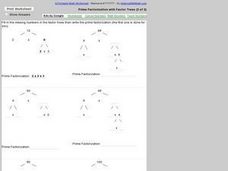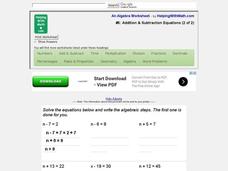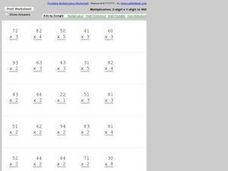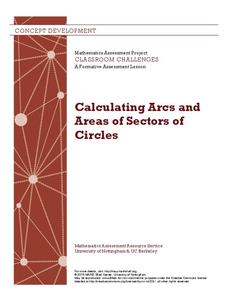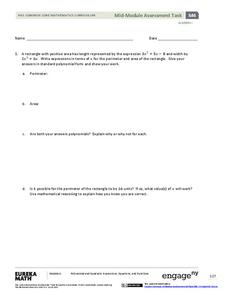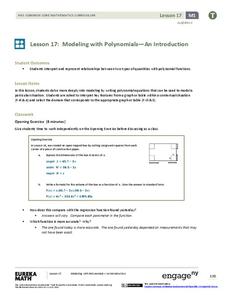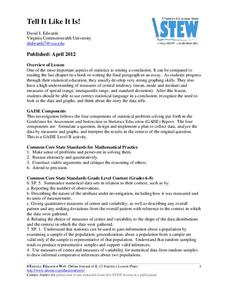TLS Books
Easter Count and Color
Mostly a holiday coloring sheet, kindergarteners also count and write the number of jellybeans depicted. Though there is only one set of objects to count, the activity does, indeed meet the stated Common Core standards. Ask individuals...
Helping with Math
Prime Factorization with Factor Trees (2 of 2)
The publisher has tagged this resource as designed to meet CCSS.Math,Content.6.NS.4, but it really is only the first step in the process of determining least common multiples and greatest common factors. Six numbers are given for...
T. Smith Publishing
Solar System Fun
Looking for some vocabulary for your unit on space? Check out this 25-word solar system crossword puzzle for ideas. There is no word bank for this puzzle, so pupils will either need prior instruction or a reference material that they can...
Helping with Math
#6: Addition and Subtraction Equations (2 of 2)
This printable contains 12 basic equations to be solved. The first one is worked out as an example, and the answers for all can be found by clicking on a "Show Answers" box found on the website. The publisher has identified this as...
Helping with Math
#5: Addition & Subtraction Equations (1 of 2)
Single-step addition or subtraction operations are applied in order to solve these 12 simple equations. An answer key is available, not so much for you, but perhaps to be used by learners as a self-correction tool. Note that the...
Helping with Math
Multiplication: 2-digit x 1-digit to 999
Thirty quick problems make this an ideal assessment when learners are working with two-digit multiplication. Note that this has been identified by the publisher as aligned to meet CCSS.Math.Content.4.NBT.5, it is rather simple and likely...
Helping with Math
Ratio and Proportion: Simplifying Ratios (1 of 2)
Here is a set of 24 pairs of numbers for which kids reduce the ratios to their simplest form. It is a simple and straightforward assignment, meant by the publisher to address CCSS.Math.Content.6.RP.3. Note, however, that it only requires...
Mathematics Assessment Project
Generalizing Patterns: Table Tiles
As part of a study of geometric patterns, scholars complete an assessment task determining the number of tiles needed to cover a tabletop. They then evaluate provided sample responses to see different ways to solve the same...
Mathematics Assessment Project
Modeling Motion: Rolling Cups
Connect the size of a rolling cup to the size of circle it makes. Pupils view videos of cups of different sizes rolling in a circle. Using the videos and additional data, they attempt to determine a relationship between cup...
Mathematics Assessment Project
Representing Quadratic Functions Graphically
Sometimes being different is an advantage. An engaging activity has scholars match cards with quadratic functions in various forms. Along the way, they learn about how each form highlights key features of quadratic functions.
EngageNY
TASC Transition Curriculum: Workshop 8
Lights, camera, action! Math educators consider how to improve their instruction by examining a model of the five-practice problem-solving model involving a movie theater. Participants examine cognitive demand in relation to problem...
Mathematics Assessment Project
Calculating Arcs and Areas of Sectors of Circles
Going around in circles trying to find a resource on sectors of circles? Here is an activity where pupils first complete an assessment task to determine the areas and perimeters of sectors of circles. They then participate in an...
West Contra Costa Unified School District
Factoring Quadratic Expressions
Factor in different strategies in a lesson plan for factoring quadratics. Young mathematicians first create tables and area models to factor quadratic trinomials into two binomials by guess and check. Learners then investigate how they...
EngageNY
Mid-Module Assessment Task - Algebra 1 (module 4)
Performance task questions are the most difficult to write. Use this assessment so you don't have to! These questions assess factoring quadratics, modeling with quadratics, and key features of quadratic graphs. All questions require...
EngageNY
Normal Distributions (part 1)
Don't allow your pupils to become outliers! As learners examine normal distributions by calculating z-scores, they compare outcomes by analyzing the z-scores for each.
West Contra Costa Unified School District
Correlation and Line of Best Fit
Computers are useful for more than just surfing the Internet. Pupils first investigate scatter plots and estimate correlation coefficients. Next, they use Microsoft Excel to create scatter plots and determine correlation...
EngageNY
Modeling with Polynomials—An Introduction (part 2)
Linear, quadratic, and now cubic functions can model real-life patterns. High schoolers create cubic regression equations to model different scenarios. They then use the regression equations to make predictions.
American Statistical Association
Tell it Like it is!
Scholars apply prior knowledge of statistics to write a conclusion. They summarize using correct academic language and tell the story of the data.
EngageNY
Normal Distributions (part 2)
From z-scores to probability. Learners put together the concepts from the previous lessons to determine the probability of a given range of outcomes. They make predictions and interpret them in the context of the problem.
Federal Reserve Bank
Financial Fables: Shopping Wisely with Olivia Owl
Cover two subjects with one lesson! First, dive into English language arts; read an eBook, answer comprehension questions, and complete a cause and effect chart about the financial fable, Shopping Wisely with Olivia Owl. Then, take...
Mathematics Vision Project
Module 7: Modeling with Functions
The sky's the limit of what you create when combining functions! The module begins with a review of transformations of parent functions and then moves to combining different function types using addition, subtraction, and...
Kenan Fellows
Reading Airline Maintenance Graphs
Airline mechanics must be precise, or the consequences could be deadly. Their target ranges alter with changes in temperature and pressure. When preparing an airplane for flight, you must read a maintenance graph. The second lesson of...
EngageNY
The Power of Algebra—Finding Pythagorean Triples
The Pythagorean Theorem makes an appearance yet again in this instructional activity on polynomial identities. Learners prove a method for finding Pythagorean triples by applying the difference of squares identity.
EngageNY
Modeling Riverbeds with Polynomials (part 1)
Many things in life take the shape of a polynomial curve. Learners design a polynomial function to model a riverbed. Using different strategies, they find the flow rate through the river.

